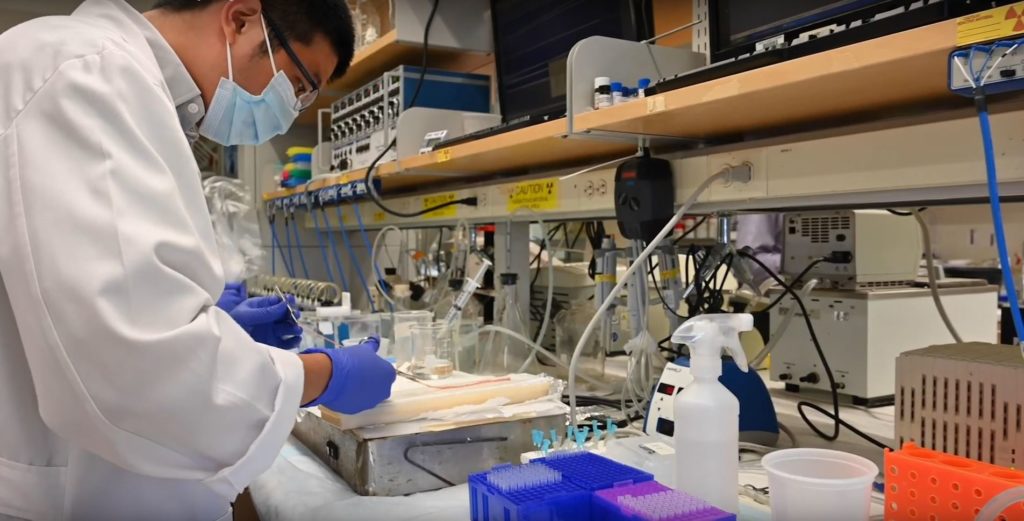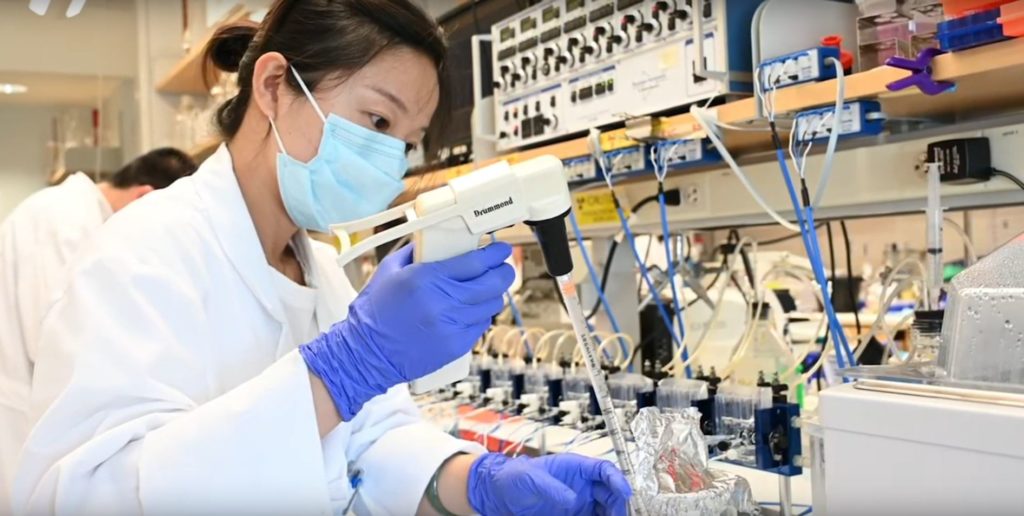UF Researcher Finds a Way to Mitigate Acute Respiratory Distress Syndrome (ARDS), a Complication of Coronavirus Infection
Dr. Sadasivan Vidyasagar Formulates Therapy That Can Help Prevent Fluid from Accumulating in the Lungs
Why would a doctor specializing in gastrointestinal disorders be interested in therapy for COVID-19, a primarily pulmonary disease? The answer lies in a seemingly convoluted link between the gastrointestinal tract and the lungs: water.
Dr. Sadasivan Vidyasagar, an associate professor from UF’s Department of Radiation Oncology, and his industrial collaborator, Stephen Gatto, CEO of Entrinsic Bioscience, Inc., have won a UF Innovate Invention of the Year award for their innovation to treat ARDS caused by COVID-19 infection.
Cells in all living things are bound by membranes that passively allow water in and out. Water always flows toward the side with the higher concentration of solute (dissolved chemicals such as salt and sugar) to equalize the concentrations on both sides of the membrane. You may remember this process from high school biology: osmosis.

Life is just a series of chemical reactions, thus the solute concentration inside of cells is constantly changing. Cells need to adapt continuously, otherwise, a sudden shift in solute concentration could cause an influx of water, bursting the cell like a water balloon. Cells avoid this fate using molecular “traffic cops,” called transporters, imbedded throughout their membranes to pump solutes in and out.
Since the late 1960s, transporters have sparked the interest of medical researchers hoping to manage disease symptoms associated with hydration. For example, when cancer patients undergo treatments such as radiation or chemotherapy, they often develop gastrointestinal toxicity that leads to dehydration via nausea or vomiting. For the past decade, Vidyasagar’s mission has been to help patients overcome these symptoms.
“Our lab’s focus has been answering that question: How do you improve hydration in people?” explained Vidyasagar, co-recipient of the UF Innovate’s Invention of the Year award during Standing InnOvation 2020.
Vidyasagar and his group developed a formulation for oncology patients, 10 years ago that is currently on the market. It uses their knowledge of cellular transporters to hydrate cancer patients by increasing their electrolyte (solutes) and fluid absorption. With that success under his belt, Vidyasagar and his team (the self-proclaimed “transport guys”) wanted to apply their expertise to help combat our current global nemesis, COVID-19.
“We wanted to see whether we can adapt the things that we learned in oncology for use in pulmonary medicine,” Vidyasagar continued, “and, fortunately, it is working.”
When our bodies attack the RNA-virus that causes COVID-19, excess fluids can accumulate in the lungs causing Acute Respiratory Distress Syndrome (ARDS), a major cause of death in COVID-19 patients. This fluid build-up adds an extra medium through which air has to diffuse, meaning less oxygen can be delivered from the airways into the lungs. Additionally, the extra moisture creates an ideal environment for secondary infections by other microbes (e.g. Streptococcus pneumoniae, which causes pneumonia and other diseases in the lungs).
“The cells of the airway and blood vessels can get infected and fluid can leak out of the blood vessels,” explained Anita Rao, licensing manager at UF Innovate | Tech Licensing. “Some transport and channel proteins are found to have reduced activity, which can cause fluid to build up in the lungs because there is less fluid clearance.”
For some time, coronavirus patients with advanced symptoms were supported by delivering oxygen using ventilators, which although lifesaving, was found to cause unavoidable damage to the airways and high-oxygen dependency. Vidyasagar wanted to find a way to mitigate disease progression without ventilator support.
“When most of the people were going after ventilators and immunotherapy, we were looking at actually what is happening in the lung,” said Vidyasagar.

His treatment formulation, which was tested in his lab using cultured lung tissues includes a few select amino acids that affect key channel proteins, that promote fluid absorption and decrease the fluid-accumulation caused lung inflammation.
“We have augmented certain channels, in particular, the epithelial sodium channel (ENaC), that enhances the fluid absorption from the airways,” Vidyasagar explained. “It tightens the mucosal barrier so that the fluid leak into the airspaces is less and the fluid absorption is actually enhanced.”
Currently, observational studies in multiple institutions across the country are taking place and Dr.Vidyasagar and Entrinsic’s Gatto are hopeful that the treatment will make a real difference.
“I am thrilled to share this award with Dr. Vidyasagar and the UF team,” said Gatto. “Our findings targeting ENaC and the impacts it has on ARDS and COVID-19 continue to push the limits of our proprietary protein modulation technology, which we believe may provide the impetus for the development of novel treatment paradigms across an array of therapeutic areas with high unmet need.”
For Vidyasagar, turning his idea into reality was crucial. This process involved vetting his idea, filing a disclosure with UF Innovate | Tech Licensing, applying for a patent, and working collaboratively with Entrinsic Bioscience, Inc., which has licensed other technologies that started as an idea in Vidyasagar’s mind. He emphasized that he has disclosed many inventions to UF Innovate | Tech Licensing in the past 10 years and added, “We have a phenomenal relationship with Tech Licensing.” “Everybody in the team, including the lab members, the people here at UF Innovate, and the partners we have at Entrinsic Bioscience, I think they all play a key role,” Vidyasagar continued, “The whole team during this COVID season worked very hard. We didn’t even shut down for a single day.”
Written by Jenelle Patterson, a marketing volunteer at UF Innovate | Tech Licensing. Jenelle is a postdoctoral candidate in UF’s horticultural sciences department.
